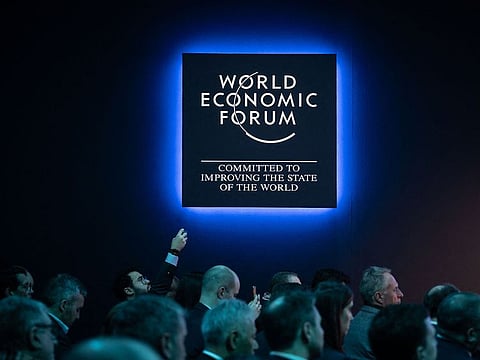Davos makes no sense, except when it does
Place comes into its own when the key players gather to hammer out practical solutions

Arriving in Davos barely eight months after our previous visit to this famous Swiss town, there were two immediate reminders of the grave, intractable issues that the world is currently facing. Both, in their own ways, were stark and vivid.
The first came before we had even begun our ascent into the mountains; in the Alpine foothills, usually crisply laden with January snow, we looked out on the sight of acres of grass, with only the faintest dusting of powder to obscure its greenery. If anyone had forgotten the news that 2022 was the warmest year on record, here was a blunt reminder.
The second came as the Forum opened. Poised and elegant, Ukraine’s First Lady, Olena Zelenska, made history by addressing the conference.
But what of the battles beyond Ukraine, to heat homes and fuel industry and support those struggling to pay bills? The war has certainly prioritised energy security.
Almost four years to the day since delegates were warned by Greta Thunberg that their house was on fire, how to go about dousing the flames has been the subject of much talk but frustratingly little action.
That has begun to change. In the past year, investments in renewable energy have leapt by 12%, up from a paltry 2% in the years after the Paris agreements were signed. Yet even with this welcome uplift, the IEA still says we are falling well short. To give us a fighting chance of hitting the Paris targets of limiting global warming to 1.5 degrees Celsius, the $1 trillion a year currently being invested needs to quadruple to $4 trillion by 2030.
Davos is at its worst when discussing abstract concepts and utopian high ideals, but it comes into its own when the key players are gathered in a room to hammer out practical solutions. There was a sense here that some of those solutions might now be closer to hand.
More equitable transition
One completely achievable catalyst to achieve a faster, more equitable transition was discussed in depth at Davos: to quote US climate envoy, Secretary John Kerry, the issue is ‘money, money, money’. Without doubt the biggest barrier to change in many developing economies, and too often the most profoundly impacted by the climate crisis, has been access to finance.
Put simply, the price of loans has been so prohibitively high that they have presented a Hobson’s Choice between financial or environmental ruin. That, all at Davos seemed to agree, must change.
From IMF managing director Kristalina Georgieva, to Secretary Kerry, via Standard Chartered CEO, Bill Winters, there was a broad acknowledgement that the business model that underpins the global system needs to be more realistic. Institutions like the World Bank, and the wealthy nations — like the United States — that fund them, need to take on more risk, and even to accept some losses, appeared to be the conclusion.
Changing the business model of those institutions is the best and quickest way to attract and leverage private sector cash and funnel it into technologies underpinning clean energy, as well as offsets like carbon capture. It can also be used to mitigate the knock-on effects on communities that are profoundly vulnerable to the economics of the energy transition, and lift up those developing nations that will form the bulk of energy demand growth in future.
Power of money
Never let it be said that the delegates at the WEF do not understand the power of money. These conversations felt like a distinct shift, perhaps even a breakthrough. It was also a sign of the value that this strange gathering can deliver.
Davos is in so many ways unfit for purpose. Remote, impractical, cold, and wildly expensive, it is an easy target for critics. At its best, however, there is nothing quite like it for gathering the disparate forces from business, politics and activism that can coalesce into consensus and action.
No one believes that a meeting like this has all the answers for the sort of interlinked ‘polycrisis’ of war, inflation, energy and food security that we currently face; but perhaps 2023’s Forum will be remembered as a moment of unity and the beginning of tangible, lasting change in at least one key area.
The IMF even told delegates it is ‘way ahead’ on the path to delivering it. ‘Watch the Spring meetings’, Secretary Kerry told me during our panel last week, referring to the upcoming gatherings of the IMF and World Bank. Davos may have played a role in helping to make sure such assurances are met.
Julia Chatterley is an anchor with CNN
Sign up for the Daily Briefing
Get the latest news and updates straight to your inbox


